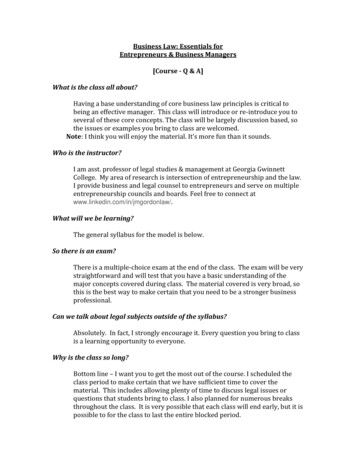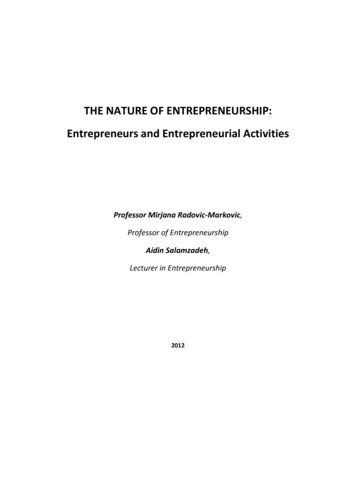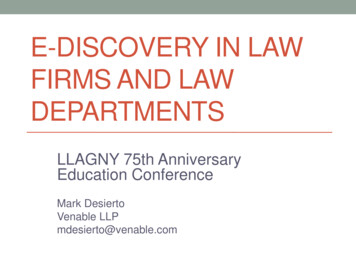
Transcription
Business Law: Essentials forEntrepreneurs & Business Managers[Course - Q & A]What is the class all about?Having a base understanding of core business law principles is critical tobeing an effective manager. This class will introduce or re-introduce you toseveral of these core concepts. The class will be largely discussion based, sothe issues or examples you bring to class are welcomed.Note: I think you will enjoy the material. It’s more fun than it sounds.Who is the instructor?I am asst. professor of legal studies & management at Georgia GwinnettCollege. My area of research is intersection of entrepreneurship and the law.I provide business and legal counsel to entrepreneurs and serve on multipleentrepreneurship councils and boards. Feel free to connect atwww.linkedin.com/in/jmgordonlaw/.What will we be learning?The general syllabus for the model is below.So there is an exam?There is a multiple-choice exam at the end of the class. The exam will be verystraightforward and will test that you have a basic understanding of themajor concepts covered during class. The material covered is very broad, sothis is the best way to make certain that you need to be a stronger businessprofessional.Can we talk about legal subjects outside of the syllabus?Absolutely. In fact, I strongly encourage it. Every question you bring to classis a learning opportunity to everyone.Why is the class so long?Bottom line – I want you to get the most out of the course. I scheduled theclass period to make certain that we have sufficient time to cover thematerial. This includes allowing plenty of time to discuss legal issues orquestions that students bring to class. I also planned for numerous breaksthroughout the class. It is very possible that each class will end early, but it ispossible to for the class to last the entire blocked period.
Course Overview & ScheduleDay 1: ClassTopic: Business Entities and Governanceo Entity Selection Considerationso Equity Considerationso Governance IssuesLearning Objective: Understand the aspects of conducting business in or with aparticular business entity type.o Master Key Concepts – Forming a particular business entity; internalrelationships (ownership structure) within the various types ofbusiness entities; authorization and distribution of equity & options;fiduciary duties among owners/managers of business entities; extentof personal and business entity liability; default tax principles forgiven entity types.Assignment: Read select material to provide a background of topic.Specific Information Covered: (Material added as necessary)o Selection Considerations: Formation – Administrative startup procedures (how to file &set up your business entity) Continuity – Continuance upon select occurrences (e.g.,Member leaving the entity) Ownership/Control – Decision-making Rights; Agency;Fiduciary Duties Liability – Limited liability entity status explained andprotections. Taxation – Default tax schemes for each entity. (Pass threw,Basis Consideration, Active/Passive Income Issues)o Equity Considerations and Agreements Board Formation and Governance: Corporate formalities inSetup. Type of stock, stock issuance plan & option agreements. General considerations in Term Sheet Negotiation (Valuation,Staging, Preferences, etc.)o Compliance Standards and Piercing the Corporate Veil Dos and Don’ts of entity maintenance.o Relevance of entity type in contractual business relationships. General discussion and scenarios.
Day 2: ClassTopic: Contract Formation; Contract Interpretation; Security Interestso Contractual Relationships in Business: Contract Formation & Format Contract Interpretation Security InterestsLearning Objective: Understand the formation, terms, enforceability, and remedieswithin a business’ contractual relationship.o Master Key Concepts – Learn the essential components of a businesscontract. Learn how contractual relationships arise, and the dutiesinherent in contractual relationships. General distinctions betweencontact formation and interpretation under common law and theUniform Commercial Code. Overview of security interests(promissory notes).Assignment: Read select material to provide a background of topic.Specific Information Covered:o Elements of a valid contract Offer, Acceptance, Consideration Verbal & Written Contracts; Gap-Fillerso Types of Contractual Relationships Unilateral and Bilateral Uniform Commercial Code & Restatement of Contractso Enforceability considerations: Statute of Frauds; Promissory Estoppel How to deal with non-compliance/breacheso Anatomy of a Contract Preamble, Recital, Words of Agreement Definitions Action Section (Consideration) Reps & Warranties Covenants & Rights Conditions to Obligations Endgame Provisions & Remedies General Provisions Signatureso Overview of Security Interests Attachment and Perfection Procedure Priority Issues among competing security interests
Day 3: ClassTopic: Securities Disclosure, Fraud, and Liability; Regulations and Small OfferingExemptionso Securities Issues: Disclosure, Fraud, and Liability Regulations and Small Offering ExemptionsLearning Objective: Understand the key Securities law provisions when making anequity investment or selling an ownership interest in a business entity.o Familiarity with Key Concepts – What qualifies as a security? What isan “offering”? General Disclosure and Registration requirements.Potential liability for use of insider information. Exemptions forcertain types of security offerings (1933 Securities Act, Sections 3(11),4(3), 4(6), Regulation A, Regulation D (Rules 504, 505, and 506).Assignment: Read select material to provide a background of topic.Specific Information:o What is a Security Offering; Registration Requirementso Applicable Laws 1933 & 1934 Act Liability provisionso Disclosure Requirements: The Prospectus/PPMo Small Offering Exemptions to Registration Overview of Statutory & Rule-Based Exemptions Insight into JOBS Act changes (General Solicitation Rules)
Day 4: ExamExam Format:o Covering all material in the notes that we cover in class. Note: If we don’t talk about it in class, it won’t be on the exam.o Approx. 50 - 75 Multiple-choice questions (allowed to explain answer)o No more than 5 short answer questions.Exam Tipso Study from the notes.o Make certain that you understand the big concepts we cover.o If there is a slide dedicated to it, then it is probably an important legalconcept.o Don’t worry - the exam is very straightforward.
Business Law: Essentials for Entrepreneurs & Business Managers [Course - Q & A] What is the class all about? Having a base understanding of core business law principles is critical to being an effective manager. This class will introduce or re-introduce you to several of these core











